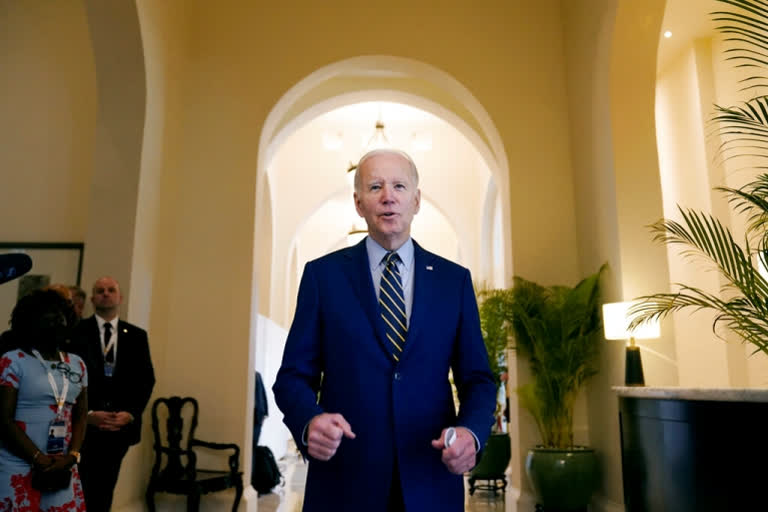Phnom Penh (Cambodia): President Joe Biden is set to meet Sunday with the leaders of Japan and South Korea to coordinate their response to North Korea's threatening nuclear and ballistic missile programs, as well as to seek input on managing China's assertive posture in the Pacific region on the eve of his planned face-to-face with President Xi Jinping.
Biden will hold separate meetings with Japanese Prime Minister Fumio Kishida and South Korean President Yoon Suk Yeol. The three leaders will then sit down together on the sidelines of the East Asia Summit in Cambodia. The meetings come as North Korea has fired dozens of missiles in recent weeks, including an intercontinental ballistic missile 10 days ago that triggered evacuation alerts in northern Japan, and as the allies warn of a looming risk of the isolated country conducting its seventh nuclear test in the coming weeks.
U.S. National Security Adviser Jake Sullivan told reporters on Saturday that Biden aims to use the meetings to strengthen the three countries' joint response to the dangers posed by North Korea, officially known as the Democratic People's Republic of Korea. "What we would really like to see is enhanced trilateral security cooperation where the three countries are all coming together," he said. "That's acutely true with respect to the DPRK because of the common threat and challenge we all face, but it's also true, more broadly, about our capacity to work together to enhance overall peace and stability in the region."
Tensions on the Korean peninsula have skyrocketed in recent months as the North continues its weapons demonstrations and the U.S. and South Korea launched stepped-up joint defense exercises. Earlier this month, the South Korean military said two B-1B bombers trained with four U.S. F-16 fighter jets and four South Korean F-35 jets during the last day of "Vigilant Storm" joint air force drills. It was the first time since December 2017 that the bombers were deployed to the Korean Peninsula. The exercise involved a total of roughly 240 warplanes, including advanced F-35 fighter jets from both countries.
North Korea responded with its own display of force, flying large numbers of warplanes inside its territory. The Biden administration has said it has sent repeated requests to negotiate with North Korea without preconditions on constraining its nuclear and ballistic missile programs, but that Kim Jong Un's government has not responded. Biden on Monday said he plans to press Xi to use China's unique sway over North Korea to curtail its aggressive behavior, as part of what is expected to be a wide-ranging bilateral meeting on the margins of the Group of 20 gathering in Bali, Indonesia.
China "has an interest in playing a constructive role in restraining North Korea's worst tendencies," Sullivan said Saturday. "Whether they choose to do so or not is, of course, up to them." Biden told reporters on Sunday that he's "always had straightforward discussions" with Xi, and that has prevented either of them from "miscalculations" of their intentions. Their meeting comes weeks after Xi cemented his grip on China's political system with the conclusion of the Community Party congress in Beijing that gave him a norm-breaking third term as leader. "His circumstances changed, to state the obvious, at home," Biden said of Xi.
Monday's meeting will be the first in-person sit-down between the leaders since Biden was elected to the White House. U.S. officials in the past have expressed frustration that lower-level Chinese officials have proven unable or unwilling to speak for Xi, and are hoping the face-to-face summit will enable progress on areas of mutual concern — and, even more critically, a shared understanding of each others' limitations.
"I know him well, he knows me," Biden said. "We've just got to figure out where the red lines are and what are the most important things to each of us, going into the next two years." Sullivan said Biden would also ask Japan and South Korea's leaders which issues they want him to talk about with Xi, though it would not be the primary discussion at their trilateral meeting. "One thing that President Biden certainly wants to do with our closest allies is preview what he intends to do," Sullivan said, "and also ask the leaders of (South Korea) and Japan, 'What would you like me to raise? What do you want me to go in with?'" (AP)



